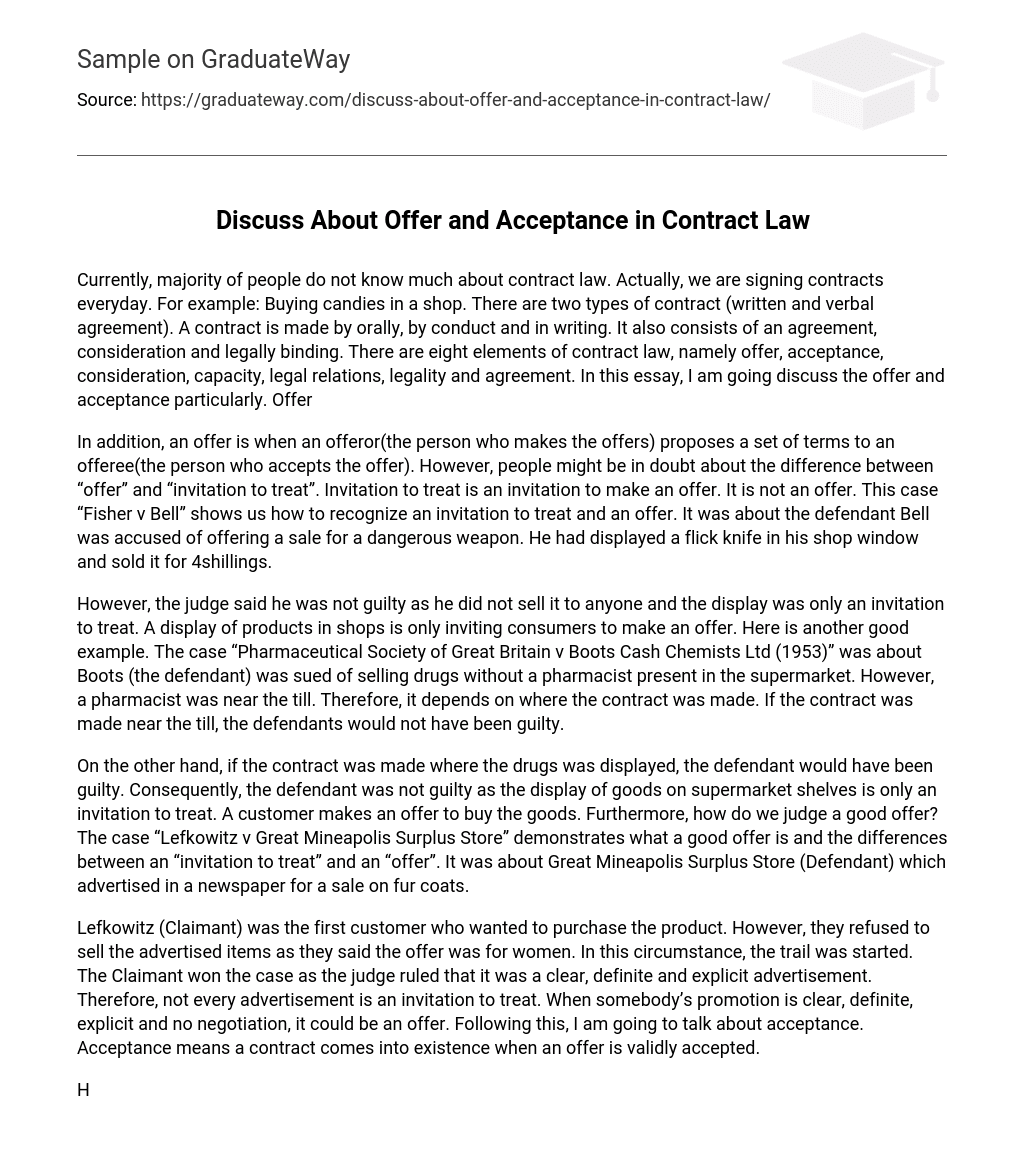Despite engaging in contract signing on a daily basis, many people currently lack knowledge about contract law. For example, when we purchase candies at a shop, we are essentially entering into a contract. Contracts can be either written or verbal agreements and can be communicated orally, through conduct, or in writing. They consist of an agreement, consideration, and a legally binding nature. Contract law encompasses eight elements: offer, acceptance, consideration, capacity, legal relations, legality and agreement. This essay will specifically focus on the aspects of offer and acceptance within contract law.
An offer occurs when the offeror proposes terms to the offeree, who then accepts. However, distinguishing between an “offer” and an “invitation to treat” may be unclear for some individuals. An invitation to treat is not considered an offer but rather an invitation to make one. The case of “Fisher v Bell” offers guidance on differentiating between these concepts. In this specific case, the defendant Bell was accused of selling a dangerous weapon. He had placed a flick knife in his shop window and sold it for 4 shillings.
The judge declared the defendant not guilty, stating that selling the item was not done and the display only served as an invitation for potential buyers. The act of showcasing products in stores merely encourages consumers to make an offer. Another notable case, “Pharmaceutical Society of Great Britain v Boots Cash Chemists Ltd (1953),” involved Boots being sued for selling drugs without a pharmacist’s presence in their supermarket. However, a pharmacist was located near the cash register. Thus, the determination of guilt hinged on where the contract was formed. If it occurred near the till, the defendant would not be considered guilty.
If the contract had been made at the location where the drugs were displayed, the defendant would have been found guilty. However, since displaying goods on supermarket shelves is considered an invitation to treat, the defendant was not found guilty. It’s important to note that it is the customer who makes an offer to purchase the goods and determining what constitutes a valid offer can be difficult. The case “Lefkowitz v Great Mineapolis Surplus Store” offers insight into what qualifies as a valid offer and highlights the distinctions between an “invitation to treat” and an “offer”. In this specific case, Great Mineapolis Surplus Store (Defendant) placed a newspaper advertisement for a sale on fur coats.
Lefkowitz (Claimant) was the initial customer who sought to purchase the product. Nevertheless, the advertised items were declined to be sold to them, as it was stated that the offer was solely for women. As a result, a legal case was initiated. The Claimant emerged victorious in the trial, as the judge determined that the advertisement was unambiguous and specific. Hence, not all advertisements can be regarded as invitations to treat. When a promotion is clear, specific, explicit, and excludes negotiation, it may constitute an offer. Consequently, I will now discuss acceptance. Acceptance refers to the point at which a contract comes into existence upon the legitimate acceptance of an offer.
The case “Felthouse v Bindley(1862)” revolves around the proper acceptance of an offer. In this particular case, Felthouse, the claimant, expressed his interest in buying a horse from his nephew for $30.75 via a written letter. He made it clear that if he received no response, he would consider himself as the owner of the horse. As the nephew intended to sell it for the same price, he decided not to reply. Nevertheless, according to court ruling, there was no acceptance of the offer and consequently no contract existed. This case established the principle that an offer must be communicated and cannot be accepted through silence or inaction.
Uncertainty may arise when deciding how to accept an offer in certain situations, such as auctions or receiving offers by post. The case “Heathcote Ball v Barry(2000)” demonstrates the mechanics of bidding in an auction. In an auction with a reserve, each bid is seen as an offer that the auctioneer accepts. Conversely, in an auction without a reserve, the auctioneer makes a unilateral offer that is accepted when the highest bid is made. Moreover, there are specific regulations governing the acceptance of offers sent by post. Firstly, for an offer to be considered valid, it must be received.
Receiving acceptance by post is crucial for the validity of an offer. Nonetheless, there are circumstances where it may still be deemed valid even if the offeree sends it. Additionally, terminating an offer holds great significance and can happen through different methods. One method involves one party refusing the offer, thereby concluding it. Another method occurs when the offeree rejects the original offer and proposes a counter-offer that modifies the terms or conditions, leading to termination of the initial offer.
Kenneth wants to sell his computer for $300, but Tim wants to buy it for $250. The initial offer can be canceled or withdrawn by the offeror before acceptance unless payment is made to keep the offer open (known as revocation). “Lapse of time” refers to the period during which the seller allows for the sale. For instance, there was an advertisement for a pair of shoes that would be sold in 2 weeks. Nicole tried to purchase them after 2 weeks but couldn’t because the offer had already been terminated.
The cancellation of an offer may occur if one party is deceased. Understanding the concepts discussed in this essay is crucial. This includes the need to communicate an offer, distinguishing between an offer and an invitation to treat, identifying circumstances that lead to termination of an offer, recognizing the attributes of a valid offer, and knowing how to accept an offer in different scenarios such as auctions or by post. These aspects are vital in contract law as they dictate the validity of agreements. Moreover, these scenarios serve as tests for evaluating the effectiveness of the law.





